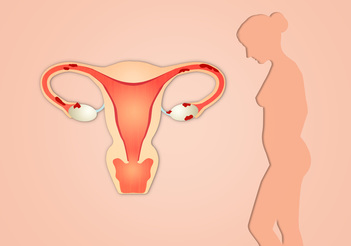Endometriosis

Endometriosis is an often painful disorder in which tissue that normally lines the inside of the uterus grows outside of the uterus. Endometriosis most commonly involves the ovaries, bowel or the tissue lining the pelvis. About 6 to 10% of all women have endometriosis. The percentage of women who have endometriosis is higher among women who are infertile (25 to 50%) and women who have pelvic pain (75 to 80%). The average age at diagnosis is 27, but endometriosis can develop in adolescents.
Symptoms
The main symptom is pain in the lower abdomen and pelvic area that are significantly worse with intercourse. The pain usually varies during the menstrual cycle, worsening before and during menstrual periods. Menstrual irregularities, such as heavy menstrual bleeding and spotting before menstrual periods, may occur. Misplaced endometrial tissue responds to the same hormones—estrogen and progesterone (produced by the ovaries)—as normal endometrial tissue in the uterus. Consequently, the misplaced tissue may bleed during menstruation and often causes cramps and pain.
Symptoms also vary depending on where the endometrial tissue is located. Possible symptoms by location include:
The misplaced endometrial tissue and its bleeding may irritate nearby tissues. As a result, scar tissue may form, sometimes as bands of fibrous tissue (adhesions) between structures in the abdomen. The misplaced endometrial tissue and adhesions can interfere with the functioning of organs.
Severe endometriosis may cause infertility when the misplaced tissue blocks the egg's passage from the ovary into the uterus. Mild endometriosis may also cause infertility, but how it does so is less clear. During pregnancy, endometriosis may become inactive (go into remission) temporarily or sometimes permanently. Endometriosis tends to become inactive after menopause because estrogen levels decrease.
Risk factors for endometriosis include:
If you are experiencing any of the symptoms above, please contact Dr. Linda Gedeon for proper evaluation and to discuss the best treatment options for you.
Symptoms
The main symptom is pain in the lower abdomen and pelvic area that are significantly worse with intercourse. The pain usually varies during the menstrual cycle, worsening before and during menstrual periods. Menstrual irregularities, such as heavy menstrual bleeding and spotting before menstrual periods, may occur. Misplaced endometrial tissue responds to the same hormones—estrogen and progesterone (produced by the ovaries)—as normal endometrial tissue in the uterus. Consequently, the misplaced tissue may bleed during menstruation and often causes cramps and pain.
Symptoms also vary depending on where the endometrial tissue is located. Possible symptoms by location include:
- Large intestine: Abdominal bloating, pain during bowel movements, or diarrhea, constipation, or rectal bleeding during menstruation
- Bladder: Pain above the pubic bone during urination and urine that contains blood
- Ovaries: Formation of a blood-filled mass (endometrioma), which sometimes ruptures or leaks, causing sudden, sharp abdominal pain
The misplaced endometrial tissue and its bleeding may irritate nearby tissues. As a result, scar tissue may form, sometimes as bands of fibrous tissue (adhesions) between structures in the abdomen. The misplaced endometrial tissue and adhesions can interfere with the functioning of organs.
Severe endometriosis may cause infertility when the misplaced tissue blocks the egg's passage from the ovary into the uterus. Mild endometriosis may also cause infertility, but how it does so is less clear. During pregnancy, endometriosis may become inactive (go into remission) temporarily or sometimes permanently. Endometriosis tends to become inactive after menopause because estrogen levels decrease.
Risk factors for endometriosis include:
- Family history
- Any medical condition that prevents the normal passage of menstrual flow out of the body
- Use of intrauterine devices
- Unbalanced estrogen levels
- Exposures to Xenoestrogens
- History of pelvic infection
If you are experiencing any of the symptoms above, please contact Dr. Linda Gedeon for proper evaluation and to discuss the best treatment options for you.

